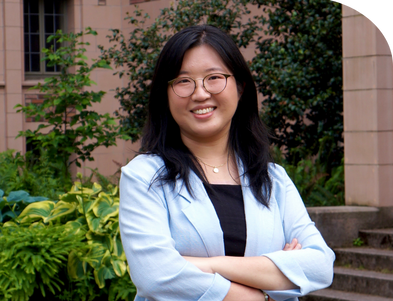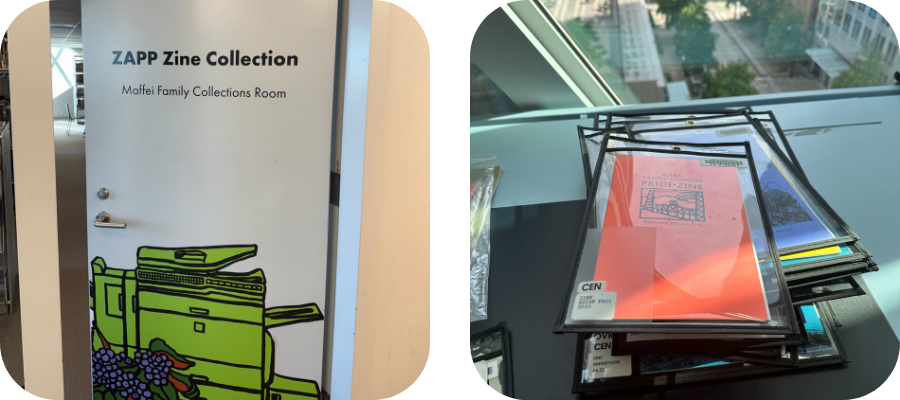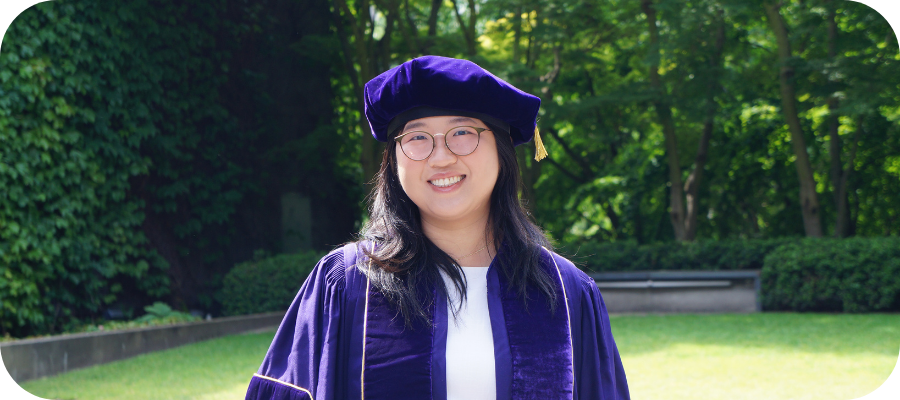

From Instagram scroll to dissertation centerpiece, Carolyn Fan weaves together theory, policy, and community storytelling to show how research can both study and embody equity.
While scrolling through Instagram, Carolyn Fan, a recent PhD graduate and Co-chair of the ARCH Student Advisory Board, came across a post from Seattle-based artist Monyee Chau about their 2023 artist residency at the Seattle Public Library. They shared pictures from the library’s ZAPP Zine Collection—an archive of over 30,000 zines from across the country. At the time, Fan was pursuing her PhD in health services and was looking for a way to incorporate community into her thesis. “My project focused on QTBIPOC (Queer, Trans, Black, Indigenous people of color) health and how the intersection of race, sexual orientation, and gender affects health,” said Fan. “The zines were the perfect addition.”
In addition to analyzing the zines, Fan’s thesis also compiled strategies to incorporate anti-racism principles in research, and studied structural racism and LGBTQ+ discrimination in state-level policy. “Each part of the project was quite different, and they each had their own goals, but together they highlight the forces that shape health for QTBIPOC folks,” said Fan. “My goal was to not only highlight the harm that these structural determinants cause but also show how they can be flipped and leveraged for good by uplifting resistance and community strengths.”

Painting the Whole Picture
Fan’s first aim reviewed how Public Health Critical Race Praxis (PHCRP), a framework that asks how racism shapes health—and how to change it–has been applied in public health research. She found that public health practitioners and researchers were using the framework in diverse ways. Notably, there was a spike in use following the murder of George Floyd in 2020, indicating how social movements may influence research. “As a public health researcher, it was so useful for me to see the many ways PHCRP is being used in the field, from small changes to huge overhauls,” said Fan. “I hope this thesis will give researchers concrete and practical things they can apply to their work, which is important especially now, when a lot of education and research on anti-racism is being shut down.”
For her second aim, Fan analyzed structural racism and LGBTQ discrimination across the U.S. using both data from the Behavioral Risk Factor Surveillance System (BRFSS) and the Database of Structural Racism-Related Laws compiled by Dr. Medina Agénor. She found that harmful policies especially affect the health and healthcare access of QTBIPOC communities, but also harm everyone else in the process—including White, non-LGBTQ+ people. “I think when you look at structural racism as a whole, it can feel overwhelming and daunting to figure out how you can change things. But policies are smaller pieces that we have the power to change,” said Fan. “My analysis shows policy makers, practitioners, advocates, and community members where we need to target our efforts to better the lives of our communities.”
Zines as Art and Data
The final part of Fan’s thesis analyzed the QTBIPOC-authored zines. Zines, short for fanzines or magazines, are independent, self-made publications, often featuring art, writing, and resources. Zines are typically created by communities outside the mainstream, offering an opportunity for marginalized peoples to express and share their lived experiences. Fan used the zines to explore lived experiences of racism, gendered discrimination, and community-based strengths and solutions. She designed a participatory “research salon” with undergraduate students from the “Race, Racism, and Public Health” course, where she worked as a TA.
The research salon was a two-day intensive, where students gathered with Fan to learn about qualitative methods and critical theory, and then coded and discussed identified themes. “We had a big discussion about how art can be a source of data and community building,” said Fan. “The students were brilliant and came up with themes and findings that I could never have done on my own. It really showed what we can learn when we are in community and conversation with each other.”
It’s not just about using data and findings to point to equity, it’s about using the research process itself to support others, to share power, and to create opportunities.
The group found that the zines themselves were a source of strength and community, making a space to create and share similar experiences. They also found that the zines offered different resources, safe places in the community, or tips and advice for navigating certain circumstances as a QTBIPOC person. “It was such a cool experience because we were learning about building community while we were actively building our own,” said Fan. “I walked away from the salon thinking, ‘This type of communal research, teaching, and learning is what I want to do for the rest of my life.”
Fan’s Philosophy
Fan’s advice to students who hope to do similar work is to be bold and find a supportive community. “Explore your interests, even if it doesn’t feel like the conventional or expected route,” said Fan. “And make sure you find a place for yourself with peers who share your passions and values, who share your vision. For me, that place was ARCH, and I’ve learned more there than I ever expected.”
Through her work, Fan has found one guiding belief to guide her future endeavors: research must embody equity, not just describe it. “This project has taught me that it’s not just about using data and findings to point to equity, it’s about using the research process itself to support others, to share power, and to create opportunities,” said Fan. “As I move forward from my program, I want to use my privilege and position in academia to uplift others.”
